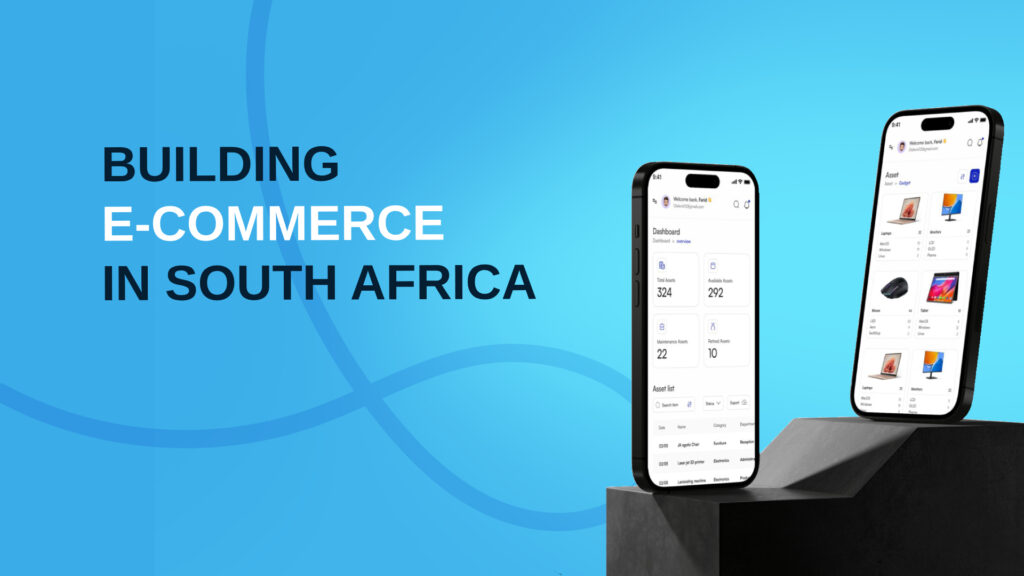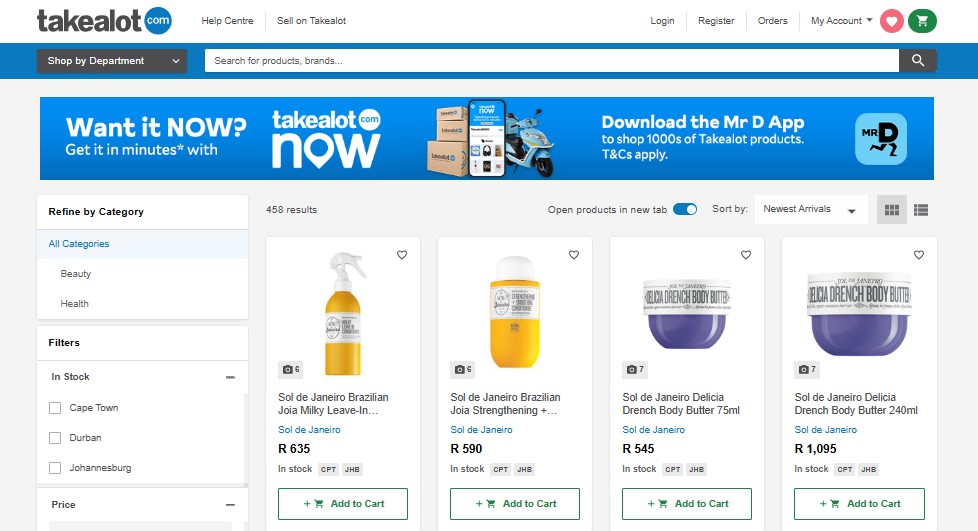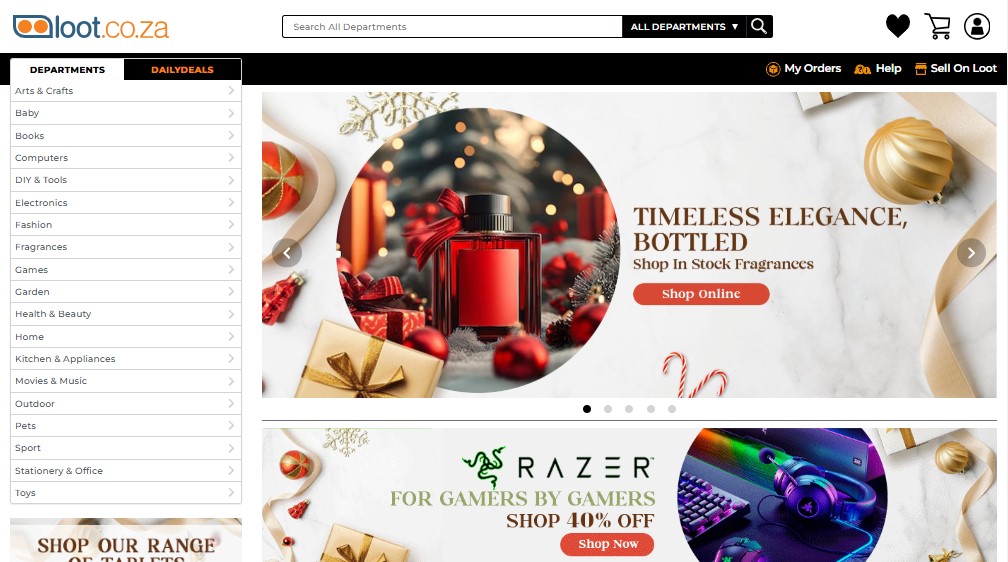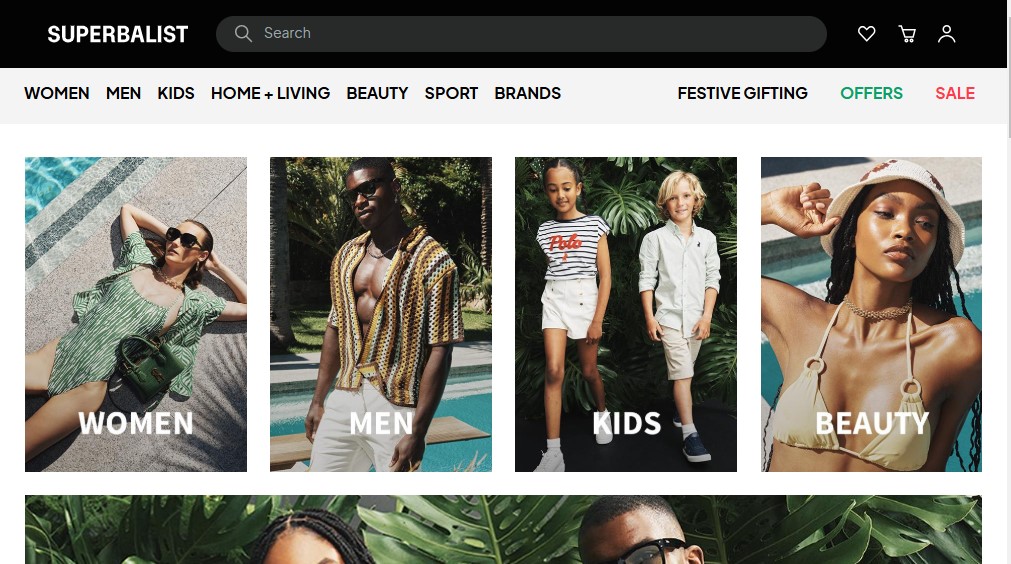
building ecommerce
in south africa
South Africa’s e-commerce landscape is flourishing, driven by tech adoption and shifting consumer habits.
We will look at leading e-commerce brands in retail, tech, and fashion, highlight their successful strategies, and discusses a failed platform to identify pitfalls to avoid.
The State of E-commerce in South Africa
The South African e-commerce market has experienced significant growth, expected to continue in the coming years. By 2025, online spending is projected to grow from R59 billion in 2022 to R225 billion, an increase of nearly 300%.
Key factors driving this growth include:
Increased Internet Access: South Africa’s online shopper base has expanded to approximately 27 million people, largely due to affordable mobile data and broader internet penetration.
Evolving Consumer Preferences: Convenience, deals, and variety continue to drive e-commerce adoption. Around 61% of South Africans shop online for convenience, while 70% look for deals.
Technological Innovations: Advancements in AI, predictive analytics, and diverse payment options, such as QR codes and Buy Now, Pay Later (BNPL), have enhanced the shopping experience.
Diverse Product Categories: Once focused on tech products, e-commerce now includes essentials, apparel, home goods, and more. Categories like home and garden, electronics, and fashion dominate the market.
Successful E-commerce Brands
1. Retail: Takealot
Takealot leads South Africa’s e-commerce scene with diverse product categories and a mobile-first approach. Features such as personalized recommendations, an extensive delivery network, and frequent sales events like ‘Blue Dot Specials’ give Takealot a competitive edge. Its marketing leverages targeted ads, partnerships, and loyalty programs like ‘Takealot Rewards’ to build customer retention.

2. Tech: Loot.co.za
Loot.co.za specializes in tech gadgets, books, and accessories. The platform’s competitive pricing, seasonal promotions, and loyalty incentives set it apart. Its user-friendly website ensures smooth navigation with advanced search and filter options. Email marketing is a core strategy, offering personalized deals to engage users.

3. Fashion: Superbalist
Superbalist appeals to younger demographics with trendy, curated collections. The brand excels at influencer marketing, visually rich content, and engaging social media campaigns. Its e-commerce platform offers intuitive interfaces with practical tools like size guides, style tips, and a wishlist feature. Seasonal campaigns, flash sales, and collaborations with local designers enhance its appeal.


From Hero to Zero for Zando
Zando, once a promising online fashion retailer, ceased operations in 2024. Initially positioned as a competitor to Superbalist, Zando’s decline highlights several challenges:
Intense Competition: Superbalist and international platforms like SHEIN outperformed Zando with aggressive pricing and superior marketing.
Operational Costs: High costs related to inventory and logistics overwhelmed Zando’s profitability. Its delivery network lacked the scale of established players like Takealot.
Limited Differentiation: Zando failed to establish a unique selling proposition (USP). Unlike Superbalist, it didn’t build strong connections with local fashion communities or emphasize sustainability—a growing consumer priority.
Economic Pressures: South Africa’s economic challenges, including high inflation and reduced consumer spending, further strained Zando’s financial health.

Lessons from Zando’s Failure
Adapt to Market Needs: A clear USP and agility in responding to consumer trends are essential.
Operational Efficiency: Strong logistics and inventory management are critical for long-term survival.
Customer Engagement: Personalized experiences, community involvement, and relevant offerings build loyalty.
Something To Note Across All Brands
Mobile Optimization: With mobile commerce dominating, responsive designs and seamless apps are crucial.
Convenience: Efficient delivery options and intuitive navigation remain top priorities for shoppers.
Engaging Marketing: Social media, influencer partnerships, and loyalty programs drive customer engagement.
Starting Your E-commerce Journey
For aspiring entrepreneurs, platforms like WooCommerce and Shopify provide an accessible starting point. These tools offer templates, plugins, and integrations to set up an online store with minimal technical expertise.
However, for those aiming for a custom-built platform tailored to their business needs and optimized for conversions, partnering with professionals is a game-changer. Toruna Media Group specializes in designing and developing e-commerce platforms with a deep understanding of the South African market. Our focus on user experience, branding, and scalability ensures your business thrives in the competitive e-commerce space.
